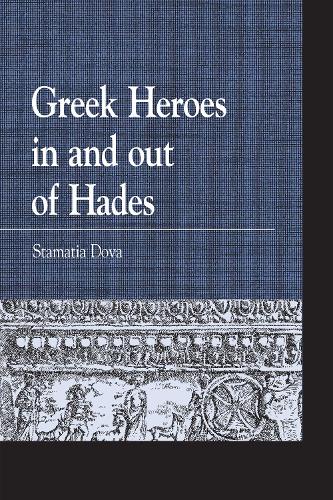
Greek Heroes in and out of Hades
(Paperback)
Available Formats
Publishing Details
Greek Heroes in and out of Hades
By (Author) Stamatia Dova
Bloomsbury Publishing PLC
Lexington Books
27th March 2014
United States
Classifications
Tertiary Education
Non Fiction
Ethics and moral philosophy
Ancient history
Ancient Greek and Roman philosophy
Social and political philosophy
880.9001
Physical Properties
Paperback
242
Width 161mm, Height 234mm, Spine 15mm
413g
Description
Greek Heroes in and out of Hades is a study on heroism and mortality from Homer to Plato. In a collection of thirty enjoyable essays, Stamatia Dova combines intertextual research and thought-provoking analysis to shed new light on concepts of the hero in the Iliad and the Odyssey, Bacchylides 5, Plato's Symposium, and Euripides' Alcestis.
Through systematic readings of a wide range of seemingly unrelated texts, the author offers a cohesive picture of heroic character in a variety of literary genres. Her characterization of Achilles, Odysseus, and Heracles is artfully supported by a comprehensive overview of the theme of descent to the underworld in Homer, Bacchylides, and Euripides. Aimed at the specialist as well as the general reader, Greek Heroes in and out of Hades brings innovative Classical scholarship and insightful literary criticism to a wide audience.
Reviews
Dova (Hellenic College and Center for Hellenic Studies) considers key aspects of the ancient Greek hero in relation to his mortality, primarily by reference to the type-scene of the katabasis. Her study centers on Odysseus, Heracles, and Achilles, across the genres of epic, lyric, tragedy, and Platonic dialogue, and takes as its starting point Odysseus's confrontations with Achilles and Heracles in the underworld in Odyssey 11. A series of brief, closely focused discussions sets these heroes in relation to Agamemnon, Meleager (in Bacchylides 5), and Alcestis (in Euripides's drama of the same name), and combine to articulate a cumulative argument that distinguishes between Odysseus's success in tampering with the limits of mortality (in the Odyssey), Heracles's attainment of an Olympian alternative to mortality (in Bacchylides), and Achilles's acceptance of his mortality (in the Iliad). Dova is at her most interesting in the final chapter, where she trains her attention, and philological methods honed in reading Homer, on Euripides's Alcestis and Plato's Symposium to discern a dialogue between genders and genres that sheds light on the epic heroes precisely through inversion of the heroic model. Summing Up: Recommended. Graduate students, researchers, faculty. * Choice Reviews *
In Greek Heroes in and out of Hades, Stamatia Dova offers the lover of Greek poetry and philosophy a lavish feast of epic, lyric, and tragic poetic fare. ... One of the highlights of the book is Dovas complex recasting of the hero Odysseus from his traditional framing. ... Dovas Greek Heroes in and out of Hades is a rich work that will satisfy many a classical scholars palette. . . . [P]hilosophers and classicists. . . are in for a rare treat. * Nordicum-Mediterraneum *
A thought-provoking and timely work on an important but, in a number of cases, underexplored topic. This engaging book, written with commendable sensitivity, markedly contributes to our understanding of the intricate and elusive concept of the hero in archaic and classical Greece. I have nothing but praise for Dova's achievement. -- Dimitrios Yatromanolakis, The Johns Hopkins University
Dovas book on the poetics of katabasis is exemplary in its demonstration of Homers sophisticated engagement with previous and contemporary poetic traditions. It also shows with great originality and detail that Homeric and alternative epic paths can be developed and combined in other genres such as lyric poetry or tragedy. The heroic journey to Hades was a topic in which ancient poets made their best to portray their particular visions of man and cosmos, and this book is a fascinating exploration of some of their finest achievements. -- Miguel Herrero de Jauregui, Universidad Completense de Madrid
Stamatia Dova is an expert guide into the poetic and ritual depths beneath Greek concepts of heroic death, eternal glory, and the life well lived. In a series of meticulous and sensitive close readings of many key texts, large and small from Orphic tablets to Homeric epic, lyric poetry, and Athenian tragedy she traces the central importance of descent to the underworld and its varied interconnections with major concerns like love and self-love, the inescapable facts of suffering and the discovery of transcendent values. Her path-breaking analysis of the speech-genre of makarismos anchors a wide-ranging study of what it means to be called 'blessed' in an ancient Hellenic context. Anyone interested in the roots of Western approaches to the problems of living will find this book absolutely illuminating. -- Richard Martin, Anthony and Isabelle Raubitschek Professor in Classics, Stanford University
Author Bio
Stamatia Dova is Associate Professor of Classics and Modern Greek Studies at Hellenic College in Brookline, MA, and Associate in Hellenic Literature and Language at the Center for Hellenic Studies in Washington, D.C. Her research interests include Homeric epic, the concept of the hero in ancient Greek civilization, ancient and modern Greek language pedagogy, and reception studies.
